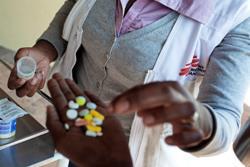Stigma: It’s not just about HIV anymore


Shiba had been feeling unwell for months, prompting her to visit a local traditional healer for treatment. When she began running a high fever, her children phoned their grandmother Lizzy Jockia for help.
Shiba refused to attend her local clinic for fear of being stigmatised by fellow community members so she and an aunt travelled to the next nearest clinic where Shiba was diagnosed with pulmonary TB.
According to family members, she died unexpectedly within hours. A single mother following the death of her husband eight years earlier, Shiba leaves behind three children.
Jockia tells OurHealth that she wishes her daughter would been open with her about her health sooner
“If she only trusted us, I am sure the outcome would be different,” says Jockia, who adds Shiba’s death has been particularly hard for her oldest child who at 11 years old had been worried about her mother’s unknown illness. “Hours before she died, I pleaded with her to disclose her status to her daughter because the child was worried about her mother’s sickness.”
It’s not just about HIV anymore
For more than three decades, activists and health workers alike have known that HIV stigma remains a silent killer – keeping people away from HIV testing and care.
As South Africa sees about 450,000 new TB cases annually, there is a growing recognition of a new kind of stigma – TB stigma.
[quote float= right]“If she only trusted us, I am sure the outcome would be different”
With about half of all new TB cases occurring among people living with HIV, the country’s latest HIV stigma index included a new category to track TB stigma. The first national study to measure TB stigma, the index found TB was believed to be the second leading cause of stigma experienced by people living with HIV after HIV itself. More than one-third of the people who reported having previously publicly disclosed having TB reported being teased, insulted or sworn at because of their TB status while about 40 percent reported being the subject of gossip.
Unsurprisingly, about 33 percent of survey respondents who had previously had TB said they chose not to tell people – a fact that may have health implications for the ones they love.
Bheki Khumalo is a health promoter at Mpumalanga’s Iswepe Clinic and says that with young children and an elderly, hypertensive mother in the house, it would have been important for Shiba to be screened early for TB so family members could also be tested for TB.
When a person is diagnosed with pulmonary TB or TB of the lungs, health workers must screen those who have been in close contact with the patient for TB. Also called “contact tracing,” this helps get people treatment sooner and prevents the spread of the bacteria in communities.
According to national guidelines, children under the age of five years old and those with compromised immune systems who have been in close contact with a confirmed TB patient and do not have active TB themselves should be started on the drug isoniazid to prevent them from developing TB.
Shiba’s sister recently took her oldest child to a local clinic for screening.
An edited version of this story was also published on Health24.com
- Watch this short video to see how OurHealth citizen journalism was born
- Read more: HIV stigma more than a distant memory to some
Author
Republish this article
This work is licensed under a Creative Commons Attribution-NoDerivatives 4.0 International License.
Unless otherwise noted, you can republish our articles for free under a Creative Commons license. Here’s what you need to know:
You have to credit Health-e News. In the byline, we prefer “Author Name, Publication.” At the top of the text of your story, include a line that reads: “This story was originally published by Health-e News.” You must link the word “Health-e News” to the original URL of the story.
You must include all of the links from our story, including our newsletter sign up link.
If you use canonical metadata, please use the Health-e News URL. For more information about canonical metadata, click here.
You can’t edit our material, except to reflect relative changes in time, location and editorial style. (For example, “yesterday” can be changed to “last week”)
You have no rights to sell, license, syndicate, or otherwise represent yourself as the authorized owner of our material to any third parties. This means that you cannot actively publish or submit our work for syndication to third party platforms or apps like Apple News or Google News. Health-e News understands that publishers cannot fully control when certain third parties automatically summarise or crawl content from publishers’ own sites.
You can’t republish our material wholesale, or automatically; you need to select stories to be republished individually.
If you share republished stories on social media, we’d appreciate being tagged in your posts. You can find us on Twitter @HealthENews, Instagram @healthenews, and Facebook Health-e News Service.
You can grab HTML code for our stories easily. Click on the Creative Commons logo on our stories. You’ll find it with the other share buttons.
If you have any other questions, contact info@health-e.org.za.
Stigma: It’s not just about HIV anymore
by cynthiamaseko, Health-e News
January 13, 2016


